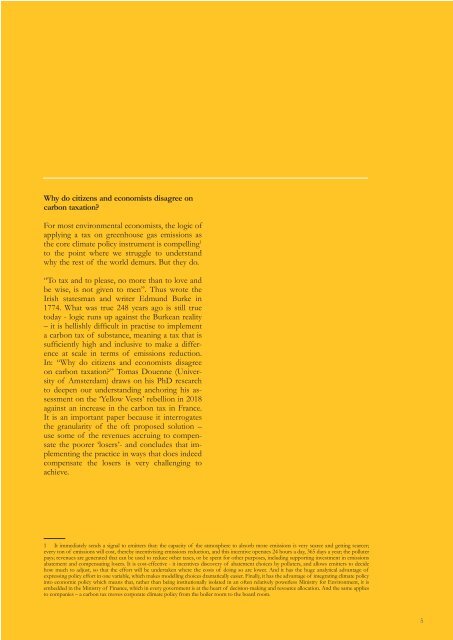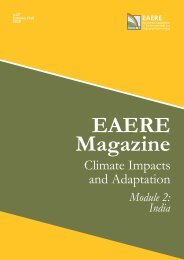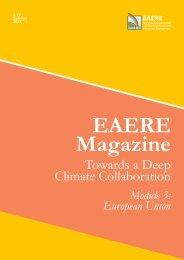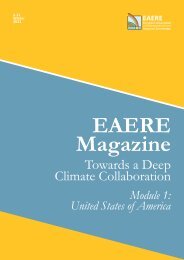EAERE Magazine - N.16 Spring 2022__
Create successful ePaper yourself
Turn your PDF publications into a flip-book with our unique Google optimized e-Paper software.
<strong>EAERE</strong> <strong>Magazine</strong> / n.16 <strong>Spring</strong> <strong>2022</strong> - Climate Impacts and Adaptation<br />
Why do citizens and economists disagree on<br />
carbon taxation?<br />
For most environmental economists, the logic of<br />
applying a tax on greenhouse gas emissions as<br />
the core climate policy instrument is compelling 1<br />
to the point where we struggle to understand<br />
why the rest of the world demurs. But they do.<br />
“To tax and to please, no more than to love and<br />
be wise, is not given to men”. Thus wrote the<br />
Irish statesman and writer Edmund Burke in<br />
1774. What was true 248 years ago is still true<br />
today - logic runs up against the Burkean reality<br />
– it is hellishly difficult in practise to implement<br />
a carbon tax of substance, meaning a tax that is<br />
sufficiently high and inclusive to make a difference<br />
at scale in terms of emissions reduction.<br />
In: “Why do citizens and economists disagree<br />
on carbon taxation?” Tomas Douenne (University<br />
of Amsterdam) draws on his PhD research<br />
to deepen our understanding anchoring his assessment<br />
on the ‘Yellow Vests’ rebellion in 2018<br />
against an increase in the carbon tax in France.<br />
It is an important paper because it interrogates<br />
the granularity of the oft proposed solution –<br />
use some of the revenues accruing to compensate<br />
the poorer ‘losers’- and concludes that implementing<br />
the practice in ways that does indeed<br />
compensate the losers is very challenging to<br />
achieve.<br />
1 It immediately sends a signal to emitters that: the capacity of the atmosphere to absorb more emissions is very scarce and getting scarcer;<br />
every ton of emissions will cost, thereby incentivising emissions reduction, and this incentive operates 24 hours a day, 365 days a year; the polluter<br />
pays; revenues are generated that can be used to reduce other taxes, or be spent for other purposes, including supporting investment in emissions<br />
abatement and compensating losers. It is cost-effective - it incentives discovery of abatement choices by polluters, and allows emitters to decide<br />
how much to adjust, so that the effort will be undertaken where the costs of doing so are lower. And it has the huge analytical advantage of<br />
expressing policy effort in one variable, which makes modelling choices dramatically easier. Finally, it has the advantage of integrating climate policy<br />
into economic policy which means that, rather than being institutionally isolated in an often relatively powerless Ministry for Environment, it is<br />
embedded in the Ministry of Finance, which in every government is at the heart of decision-making and resource allocation. And the same applies<br />
to companies – a carbon tax moves corporate climate policy from the boiler room to the board room.<br />
5 5













